English Curriculum Intent
At Sproatley Endowed CE Academy, our ambition is to nurture and develop confident and thoughtful learners who approach reading and writing with enthusiasm. We aspire to weave literacy through all areas of the curriculum, ensuring that children are aware of the relevance of these skills in life. This includes oral and communication skills, the foundation of which are laid in EYFS. We aim to prepare our children for their future by giving them the fluency of speaking, reading and writing skills necessary to succeed.
Reading
Reading is at the heart of learning at Sproatley Endowed CE Academy; teaching and the environment is carefully planned to promote a love of reading and an understanding of its relevance in the wider world. Staff work to provide a wide range of learning opportunities to ensure that children develop both their word recognition and decoding skills in order to leave our school as fluent readers, as well as an appropriate level of reading comprehension. A strong emphasis is placed on Phonics in Nursery, Reception and Key Stage One, which develops firm foundations in order to become more fluent readers. The use of whole class and small group reading establishes and develops comprehension skills, to enable children to confidently understand a range of texts and be able to apply this to the wider curriculum. Vocabulary is explored as a key element of texts and children broaden their application of new vocabulary within their writing. Through dialogic talk, children are able to discuss, question and analyse ideas and texts which allows them to grow into critical readers. By promoting an enjoyment and respect for reading, we are providing our children with the skills required to continue their future development.
EYFS/Key Stage One
Children read individually, in small groups and as a whole class. A variety of different genres are chosen at an appropriate level of ability for each group of children. As well as being able to read the text, children are encouraged to discuss the content of the book and their opinions about people, places and events are sought. The more able readers will be asked about the varied themes of different texts.
Our reading scheme is colour banded and is made up of books from a variety of publishers to provide engaging and motivating reading experiences for our pupils. In the early stages the books are predominantly phonics based to allow for regular practising and application of these skills.
Our reading scheme is colour banded and is made up of books from a variety of publishers to provide engaging and motivating reading experiences for our pupils. In the early stages the books are predominantly phonics based to allow for regular practising and application of these skills.
Key Stage Two
Reading in Key Stage 2 develops and extends the skills established in Key Stage 1 through a range of different approaches such as shared reading in both literacy lessons and cross-curricular sessions, independent reading, small guided reading groups and opportunities for reading for pleasure. The focus of reading steadily becomes ‘reading to learn’ rather than ‘learning to read’. Staff plan with a text at the heart of most learning, to allow children to contextualise their reading and subsequently, learning.
Children explore a wide variety of genres, both fiction and non-fiction, which provide them with opportunities to analyse a range of the features of the text, as well as their understanding of what they have read. Audience and purpose is an increasingly important aspect for children to explore, as well as tone, themes and structure, among others.
In April 2016 we developed a new reading scheme in order to allow children more ownership over the books that they are reading. In Key Stage 2, books are divided up into “All, Most and Expert” sections in each year group and have been organised using a range of guidance to fit with the age related expectations of the different year groups. The children are responsible for choosing their own books from these sections (with guidance from staff) to promote a love of reading. Independence when choosing books increases as the children move through Key Stage 2.
Children explore a wide variety of genres, both fiction and non-fiction, which provide them with opportunities to analyse a range of the features of the text, as well as their understanding of what they have read. Audience and purpose is an increasingly important aspect for children to explore, as well as tone, themes and structure, among others.
In April 2016 we developed a new reading scheme in order to allow children more ownership over the books that they are reading. In Key Stage 2, books are divided up into “All, Most and Expert” sections in each year group and have been organised using a range of guidance to fit with the age related expectations of the different year groups. The children are responsible for choosing their own books from these sections (with guidance from staff) to promote a love of reading. Independence when choosing books increases as the children move through Key Stage 2.
Reading Curriculum Documents
 BBC News – Education
BBC News – Education
- How much does uni cost, and will I earn more if I go?Given higher costs, some students are wondering whether going to university makes financial sense.
- Rural secondary costs nearly £50,000 per pupilThe cost at Dalry in Dumfries and Galloway is more than seven times the regional average.



